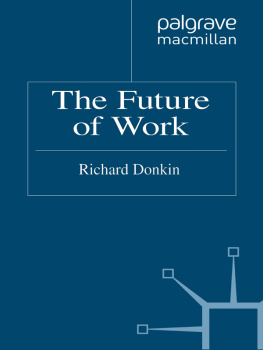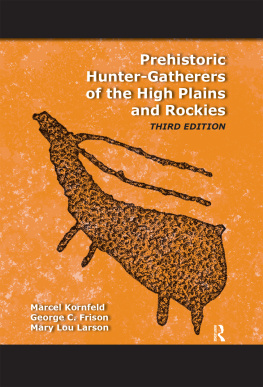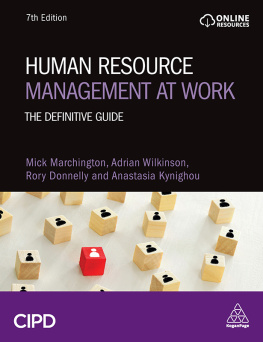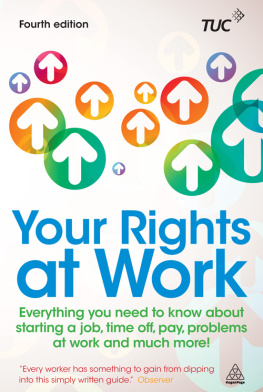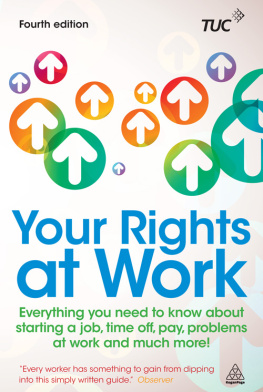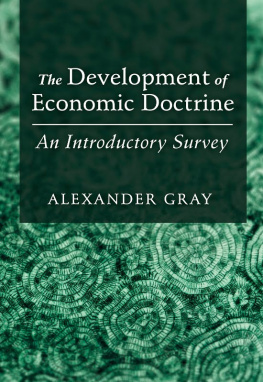Richard Donkin - The History of Work
Here you can read online Richard Donkin - The History of Work full text of the book (entire story) in english for free. Download pdf and epub, get meaning, cover and reviews about this ebook. year: 2010, publisher: Palgrave Macmillan, genre: History. Description of the work, (preface) as well as reviews are available. Best literature library LitArk.com created for fans of good reading and offers a wide selection of genres:
Romance novel
Science fiction
Adventure
Detective
Science
History
Home and family
Prose
Art
Politics
Computer
Non-fiction
Religion
Business
Children
Humor
Choose a favorite category and find really read worthwhile books. Enjoy immersion in the world of imagination, feel the emotions of the characters or learn something new for yourself, make an fascinating discovery.
- Book:The History of Work
- Author:
- Publisher:Palgrave Macmillan
- Genre:
- Year:2010
- Rating:3 / 5
- Favourites:Add to favourites
- Your mark:
- 60
- 1
- 2
- 3
- 4
- 5
The History of Work: summary, description and annotation
We offer to read an annotation, description, summary or preface (depends on what the author of the book "The History of Work" wrote himself). If you haven't found the necessary information about the book — write in the comments, we will try to find it.
The History of Work — read online for free the complete book (whole text) full work
Below is the text of the book, divided by pages. System saving the place of the last page read, allows you to conveniently read the book "The History of Work" online for free, without having to search again every time where you left off. Put a bookmark, and you can go to the page where you finished reading at any time.
Font size:
Interval:
Bookmark:
Richard Donkin


Richard Donkin 2001, 2010
Foreword Warren Bennis 2010
All rights reserved. No reproduction, copy or transmission of this publication may be made without written permission.
No portion of this publication may be reproduced, copied or transmitted save with written permission or in accordance with the provisions of the Copyright, Designs and Patents Act 1988, or under the terms of any licence permitting limited copying issued by the Copyright Licensing Agency, Saffron House, 610 Kirby Street, London EC1N 8TS.
Any person who does any unauthorized act in relation to this publication may be liable to criminal prosecution and civil claims for damages.
The author has asserted his right to be identified as the author of this work in accordance with the Copyright, Designs and Patents Act 1988.
First published 2001 as Blood, Sweat and Tears by Texerey
This edition published 2010 by
PALGRAVE MACMILLAN
Palgrave Macmillan in the UK is an imprint of Macmillan Publishers Limited, registered in England, company number 785998, of Houndmills, Basingstoke, Hampshire RG21 6XS.
Palgrave Macmillan in the US is a division of St Martins Press LLC, 175 Fifth Avenue, New York, NY 10010.
Palgrave Macmillan is the global academic imprint of the above companies and has companies and representatives throughout the world.
Palgrave and Macmillan are registered trademarks in the United States, the United Kingdom, Europe and other countries.
ISBN 9780230238930
This book is printed on paper suitable for recycling and made from fully managed and sustained forest sources. Logging, pulping and manufacturing processes are expected to conform to the environmental regulations of the country of origin.
A catalogue record for this book is available from the British Library.
A catalog record for this book is available from the Library of Congress.
10 9 8 7 6 5 4 3 2 1
19 18 17 16 15 14 13 12 11 10
Printed and bound in Great Britain by
CPI Antony Rowe, Chippenham and Eastbourne
To the memory of my sister, Janet
This book is huge. In every good sense of the word. It certainly belongs on the bookshelf of every leader and every scholar in the area of management and organizational life; but even more than that, it demands to be read closely. The stories it contains are enlightening, the questions it asks are profound, and the conclusions that it offers are sure to explode many of our most sacred assumptions.
An outstanding journalist and observer of human institutions, Richard Donkin has rare qualifications for leading readers on a journey of an immense historical scope. I want to emphasize for a moment the significance of this, because I am convinced that one of the secret scandals of contemporary organizations is the ahistoricity of its managers. The nature of work has always been changing; once it did so gradually and steadily, and now it does so at a breakneck pace. When Heraclitus observed 2,500 years ago that there is nothing permanent but change, he had no way of conceiving exactly how right he could be. Yet a managers ability to shape change, to make change work for us and not against us, is negligible unless one has a grasp of how change has already left its imprints on human industry. History is indeed one of the most significant laboratories for management theory, and Donkin unlocks the door to that laboratory and leads us on a remarkable guided tour.
Donkin shows how we have become slaves to work at precisely the time that most of us living in the industrialized world have been delivered from the oppressive yoke of manual labor. Our liberation has ironically led to a new and perhaps more troubling form of bondage. Our lives are choked with work, he writes. How did it get like this? He then proceeds to address the matter skillfully over the course of several hundred pages.
Our concept of work, as he observes, lags several decades behind the current reality; our outdated concept is founded on an agricultural and industrial past, and has been reinforced by a centuries-old theological and cultural sanctification of a manner of work that is no longer even performed by most of us.
He offers an encyclopedic examination of the scientific, societal, and mythic progressions of work. Everything is explored here: the first forms of work, performed by our ancestors eons ago; the development of the modern job; the simultaneous blessing and curse of industrial innovation; serfdom, slavery, and child exploitation; and of course the new and dizzying computer era characterized by what I call Information Overload Anxiety.
Over the course of this historical journey, Donkin never loses sight of the central issues that he wants to leave each reader alone to wrestle with. Seeing where we have come from and sensing where we might be headed, he exhorts us to find new ways to think about the very nature of work and how we measure and reward it. Can we do so, he asks, in a manner that allows humans to express their full range of gifts in the classical Greek ideal? Can we keep women and men from being victimized by social and technological change, and can we help people who are so depleted by their treadmill work pace that they have forgotten the greater purposes of their work?
Even beyond these soul-sized matters, I have found myself in recent years telling leaders and academics that there are a number of specific questions about work that will need to be answered soon. Among them: Will the best organizations of the future be smallish, ramshackle clusters of individuals or large federations? Are there limits to the value of the so-called high-involvement and self-managed approach that is finally winning acceptance in so many organizations? What are we as a society to do with disparities in talent? What about the once-cherished Social Contract between employers and employees? Do we have or even need one single theory of organizational change? And finally, how do we find balance in our lives? I believe that Richard Donkins book is of considerable use in helping us to address all these sorts of questions.
Most significantly, it is by walking us through the ages that he helps us to perceive the enormous significance of our own day. In his Report to Greco, Nikos Kazantzakis points out an ancient Chinese imprecation: I curse you; may you live in an important age. And indeed we are all damned, encumbered, and burdened, as well as charmed, exhilarated, and fascinated by this curse. What a time! No small measure of credit goes to Richard Donkin for allowing us to understand this anew.
WARREN BENNIS
Distinguished Professor of Business Administration
University of Southern California
I owe thanks to many people for their help in the production of this book. The Financial Times library staff provided constant support and advice. I would particularly like to thank Pedro Das Gupta, Peter Cheek, Neil McDonald, Bhavna Patel, David Snaddon, and Philip Powell. In the F T Tokyo Bureau, Mitsuko Matsutani, Nobuko Juji, and Paul Abrahams ensured that my Japanese research program ran like clockwork. My warmest thanks also to Jackie Hare in the F T London office for her patience, hard work, and understanding as a friend and colleague. Many other FT colleagues deserve my thanks. I would single out: Martin Neilson, Bernie Flynn, Helen Timpson, and Celia Clack; Richard Lambert for letting me go; and John Ridding for bringing me back. Pradeep Jethi gave me some much-needed insights into the publishing market.
Font size:
Interval:
Bookmark:
Similar books «The History of Work»
Look at similar books to The History of Work. We have selected literature similar in name and meaning in the hope of providing readers with more options to find new, interesting, not yet read works.
Discussion, reviews of the book The History of Work and just readers' own opinions. Leave your comments, write what you think about the work, its meaning or the main characters. Specify what exactly you liked and what you didn't like, and why you think so.


